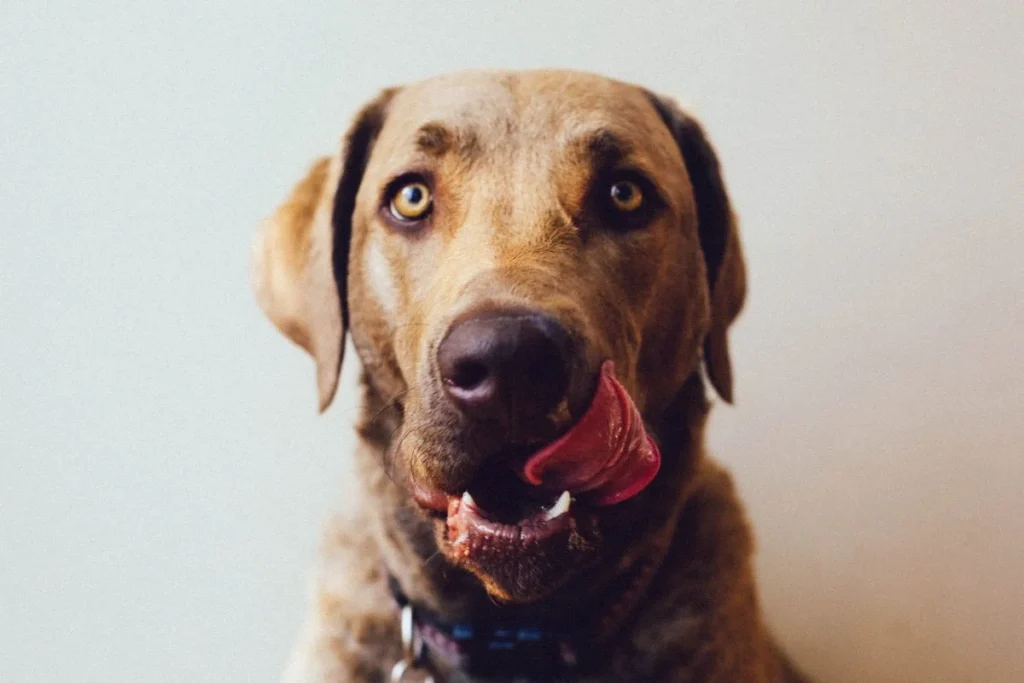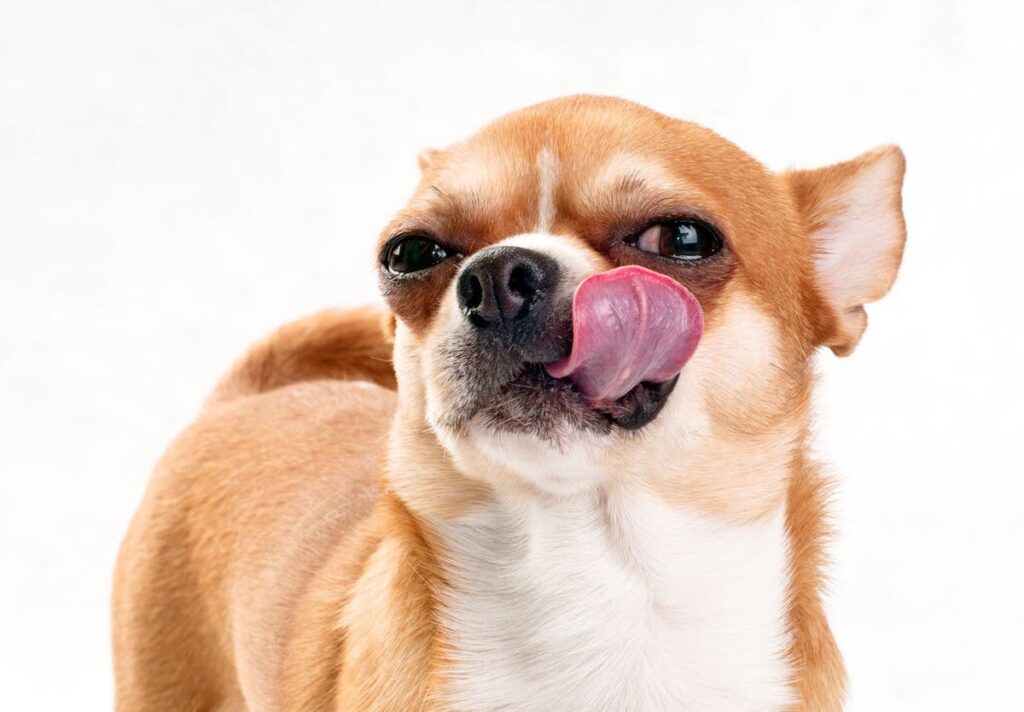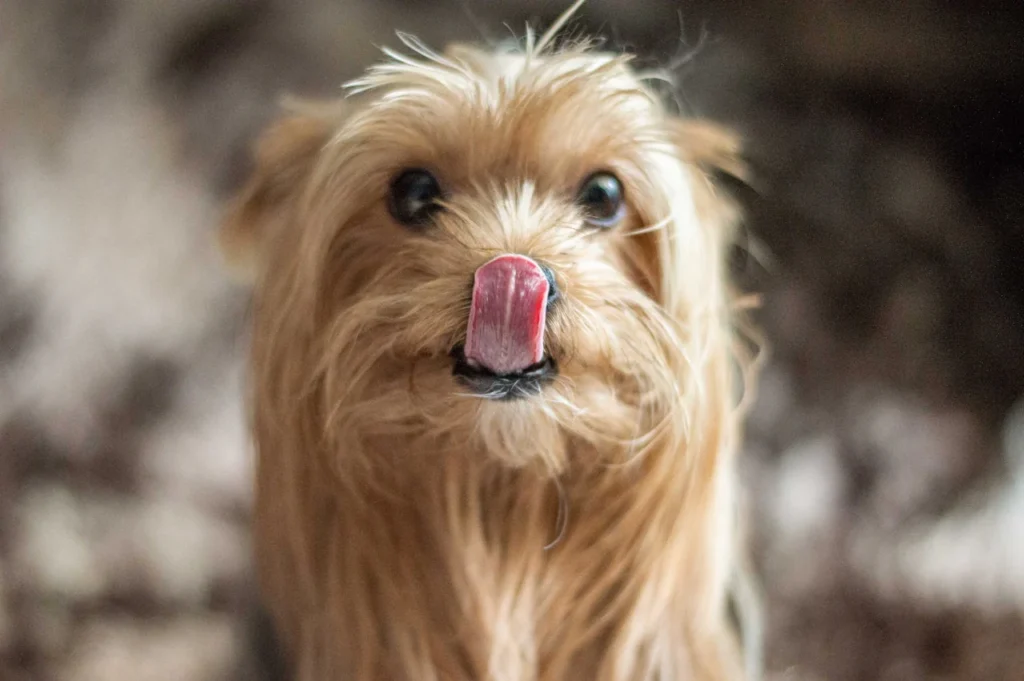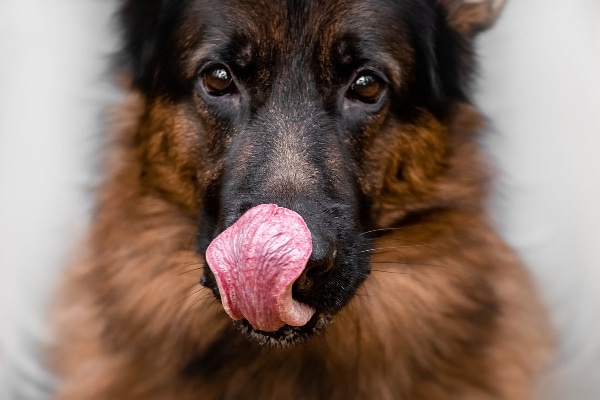Why Dogs Lick Their Lips: Causes & Solutions for Concerned Pet Owners
Discover why your dog keeps licking lips with our guide on health, behavioral, and environmental causes. Learn practical solutions and when to consult a vet.
Have you noticed your dogs lick their lips? While it might seem like a harmless habit, excessive lip-licking in dogs can be a sign of underlying issues. As pet owners, we’re always on the lookout for unusual behaviors that might indicate our dogs aren’t feeling their best.
In this comprehensive guide, we’ll explore the key reasons why your dog keeps licking its lips. From acid reflux and nausea to dental problems and stress, we’ll investigate into each potential cause. By understanding these factors, you’ll be better equipped to decode your dog’s body language and take appropriate action. Whether it’s a simple case of anticipation or a more serious health concern, we’ve got you covered with expert insights and practical advice.
Understanding Dog Lip Licking Behavior
Dogs communicate through various behaviors, and lip licking is a common yet often misunderstood signal. We’ll explore the reasons behind this behavior to help you better understand your canine companion.
Normal Reasons for Lip Licking
Lip licking in dogs isn’t always a cause for concern. Here are some typical scenarios where this behavior is perfectly normal:
- Food Anticipation: Dogs often lick their lips when they’re hungry or expecting a meal. This action stems from increased salivation due to the anticipation of food.
- Post-Meal Behavior: After eating, dogs may continue to lick their lips to manage excess saliva produced during the meal.
- Appetizing Smells: When dogs catch a whiff of something tasty, they might respond by licking their lips.
Medical Reasons for Excessive Lip Licking
While occasional lip licking is normal, excessive or persistent lip licking can indicate underlying health issues:
- Dental Problems: Periodontal disease, gum disease, tooth decay, abscesses, and broken teeth can cause mouth pain, leading to frequent lip licking. Other signs include bad breath, difficulty chewing, and pawing at the face.
- Nausea: Various factors can cause nausea in dogs, including motion sickness, food poisoning, or underlying diseases like kidney or liver problems. Nausea often results in hypersalivation and lip licking.
- Acid Reflux: Dogs suffering from acid reflux may exhibit frequent lip licking as a response to the discomfort caused by stomach acid entering the esophagus.
Behavioral Reasons for Lip Licking
Dogs also use lip licking as a form of non-verbal communication:
- Stress and Anxiety: When dogs feel uncomfortable, scared, or nervous, they may lick their lips as a calming signal. This behavior can be a self-soothing mechanism in anxious dogs.
- Submission: Dogs lick their lips to show submission or appeasement when they perceive a threat or want to avoid conflict. This behavior is often accompanied by looking away from the perceived threat.
- Appeasement: When dogs are in trouble or feel guilty, they might lick their lips as a sign of appeasement. This behavior can also occur when meeting new dogs or encountering larger or more aggressive canines.
When to Be Concerned
While occasional lip licking is normal, certain situations warrant attention:
- Frequency: If your dog is constantly licking their lips without any obvious reason, it could indicate an underlying issue.
- Accompanying Symptoms: Watch for other signs like bad breath, difficulty eating, excessive drooling, or changes in behavior.
- Sudden Changes: If your dog suddenly starts licking their lips excessively, it’s worth investigating the cause.
Understanding your dog’s body language, including lip licking, is crucial for maintaining their health and well-being. By recognizing the context and frequency of this behavior, you can better determine whether it’s a normal response or a sign of a more serious issue that requires veterinary attention.
Common Reasons Why Dogs Lick Their Lips
Dogs lick their lips for various reasons, ranging from normal behaviors to signs of discomfort or stress. Understanding these reasons can help pet owners identify potential issues and respond appropriately.
Normal Behaviors
Dogs often lick their lips as part of their natural behavior patterns. Here are some common reasons:
- Food anticipation: Dogs lick their lips when expecting food, as saliva production increases.
- Post-meal behavior: Lip licking may continue after eating as a way to clean up.
- Communication: It’s a form of non-verbal expression, indicating excitement or calmness.
- Habit or attention-seeking: Some dogs learn to lick their lips to get their owner’s attention.
- Smell response: Appetizing odors can trigger lip licking.
These behaviors are typically harmless and don’t require intervention unless they become excessive or are accompanied by other symptoms.
Signs of Stress or Anxiety
Lip licking can also indicate that a dog is experiencing stress or anxiety. Key points to consider:
- Calming signal: Dogs use lip licking as a way to show appeasement when feeling threatened or nervous.
- Contextual cues: If lip licking occurs in exact situations, it may indicate situational anxiety.
- Accompanying behaviors: Look for other signs like panting, yawning, or salivating without apparent physical reasons.
- Frequency and intensity: Excessive or constant lip licking can be a sign of chronic stress or anxiety.
- Environmental factors: Changes in routine, new people, or unfamiliar surroundings can trigger stress-related lip licking.
Recognizing these signs can help owners address their dog’s emotional needs and reduce stress triggers.
Physical Discomfort
Lip licking can also be a sign of physical discomfort or health issues in dogs:
- Dental problems: Tooth pain, gum disease, or oral injuries may cause excessive lip licking.
- Nausea: Dogs might lick their lips when feeling nauseous or before vomiting.
- Acid reflux: Gastroesophageal reflux can lead to frequent lip licking and swallowing.
- Mouth injuries: Cuts, burns, or foreign objects in the mouth can trigger lip licking.
- Dehydration: A dry mouth may cause a dog to lick its lips more frequently.
If lip licking is accompanied by other symptoms like bad breath, difficulty eating, or changes in behavior, it’s important to consult a veterinarian for a proper diagnosis and treatment.
Medical Causes for Excessive Lip Licking
Excessive lip licking in dogs can be a sign of various medical conditions. We’ll explore the most common medical causes, including oral health issues, digestive problems, and neurological concerns.
Oral Health Issues
Oral health problems are a leading cause of excessive lip licking in dogs. Periodontal disease, a progressive condition affecting the supporting structures of teeth, often triggers this behavior. Signs include bad breath, reddened gums, and difficulty chewing. Mouth pain from broken teeth, abscesses, or jaw cancer can also lead to increased saliva production and lip licking. Dogs may lick their lips frequently when trying to dislodge foreign objects stuck in their mouth or upper gastrointestinal tract. Regular dental check-ups and proper oral hygiene are crucial for preventing these issues and reducing excessive lip licking.
Digestive Problems
Digestive issues frequently cause dogs to lick their lips excessively. Nausea is a primary culprit, often resulting from various gastrointestinal problems or medication side effects. Dogs experiencing acid reflux may also exhibit frequent lip licking as they try to manage the discomfort caused by stomach acid in their esophagus. Other digestive problems that can lead to lip licking include inflammatory bowel disease, food allergies, and parasitic infections. If your dog’s lip licking is accompanied by vomiting, diarrhea, or changes in appetite, it’s essential to consult a veterinarian for proper diagnosis and treatment.

Neurological Concerns
Neurological issues can sometimes manifest as excessive lip licking in dogs. Seizures, particularly partial seizures, may cause repetitive lip licking or chewing motions. Cognitive dysfunction syndrome, common in older dogs, can lead to compulsive behaviors like excessive licking. Brain tumors or other neurological disorders might also result in unusual licking patterns. If lip licking is accompanied by other neurological symptoms such as disorientation, changes in behavior, or balance problems, it’s crucial to seek veterinary care promptly. A thorough neurological examination and possibly advanced imaging techniques may be necessary to diagnose and address these concerns effectively.
Environmental Factors Affecting Lip Licking
Environmental factors play a important role in a dog’s lip-licking behavior. These factors can trigger various responses in dogs, ranging from stress to physical discomfort. Let’s explore how dehydration, allergies, skin irritations, and foreign objects in the mouth contribute to excessive lip licking in dogs.
Dehydration
Dehydration is a common cause of excessive lip licking in dogs. When a dog’s body lacks sufficient water, it may lick its lips to moisten its mouth and stimulate saliva production. This behavior is especially noticeable in hot weather or after physical activity. Signs of dehydration include:
- Dry, sticky gums
- Sunken eyes
- Decreased skin elasticity
- Lethargy
To prevent dehydration-induced lip licking, ensure your dog has access to fresh water at all times. If lip licking persists along with symptoms like panting, pacing, or weakness, it may indicate severe dehydration requiring immediate veterinary attention.
Allergies and Skin Irritations
Allergies and skin irritations can cause discomfort around a dog’s mouth, leading to frequent lip licking. Common allergens include:
- Pollen
- Dust mites
- Certain foods
- Environmental irritants
Skin irritations may result from:
- Insect bites
- Contact with irritating substances
- Fungal or bacterial infections

When a dog experiences allergies or skin irritations, it may lick its lips in an attempt to soothe the affected area. This behavior can exacerbate the problem, leading to further irritation and even the development of hot spots. If you notice persistent lip licking accompanied by redness, swelling, or hair loss around the mouth, consult your veterinarian for proper diagnosis and treatment.
Foreign Objects in the Mouth
Dogs often explore their environment with their mouths, which can lead to foreign objects becoming lodged in their oral cavity. These objects can cause discomfort and trigger excessive lip licking. Common foreign objects include:
- Small sticks or twigs
- Grass blades
- Toy fragments
- Bone splinters
Signs that a foreign object may be present in your dog’s mouth include:
- Pawing at the mouth
- Drooling
- Difficulty eating or drinking
- Gagging or retching
If you suspect your dog has a foreign object in its mouth, carefully inspect the oral cavity. If you can’t safely remove the object or if lip licking persists, seek veterinary assistance promptly to prevent potential complications such as infections or injuries to the mouth and throat.
When to Be Concerned About Your Dog’s Lip Licking
Lip licking in dogs is often a normal behavior, but there are instances when it can signal underlying health issues. We’ll explore when to be concerned about your dog’s lip licking and what actions to take.
Frequency and Duration
Excessive or persistent lip licking is a key indicator of potential problems. If your dog is constantly licking their lips without an apparent reason, it’s time to pay attention. Normal lip licking occurs occasionally, but frequent or prolonged episodes warrant closer observation.
Accompanying Symptoms
Be alert for additional signs that may accompany lip licking:
- Bad breath
- Excessive drooling
- Difficulty chewing
- Pawing at the mouth
- Loss of appetite
- Vomiting or diarrhea
- Changes in behavior or energy levels
These symptoms, when combined with lip licking, can indicate various health issues ranging from dental problems to digestive disorders.
Dental Issues
Dental disease is a common cause of abnormal lip licking in dogs. Signs to watch for include:
- Periodontal disease
- Tooth infections
- Abscesses
If you notice your dog licking their lips excessively along with signs of oral discomfort, it’s crucial to have their teeth examined by a veterinarian.
Foreign Objects
Dogs may lick their lips persistently if there’s a foreign object stuck in their mouth. This can be a piece of food, a small toy, or other debris. If you suspect this is the case, carefully inspect your dog’s mouth or seek veterinary assistance to remove the object safely.
Nausea and Digestive Problems
Lip licking can be a sign of nausea or digestive discomfort. If your dog is licking their lips and showing other signs of gastrointestinal distress, such as:
- Decreased appetite
- Vomiting
- Diarrhea
- Lethargy
It’s important to consult with your veterinarian to rule out potential digestive issues or more serious conditions.
Stress and Anxiety
While not a medical concern, chronic stress or anxiety can lead to excessive lip licking. If you notice this behavior along with other signs of distress, such as:
- Pacing
- Trembling
- Excessive panting
- Avoidance behaviors
Consider consulting with a veterinary behaviorist to address your dog’s emotional well-being.
Sudden Changes in Behavior
Any abrupt change in your dog’s lip-licking behavior should be taken seriously. If your normally calm dog suddenly starts licking their lips frequently, it could indicate discomfort or illness that requires veterinary attention.
When to Seek Veterinary Care
We recommend consulting a veterinarian if:
- Lip licking persists for more than 24 hours
- There are accompanying symptoms of illness or discomfort
- You notice sudden changes in your dog’s behavior
- Your dog shows signs of oral pain or difficulty eating
Early intervention can prevent minor issues from becoming more serious health problems. When in doubt, it’s always best to seek professional advice to ensure your dog’s well-being.
By staying attentive to your dog’s behavior and knowing when to be concerned about lip licking, you can take proactive steps to maintain their health and happiness. Remember, regular veterinary check-ups are essential for catching potential issues early and keeping your furry friend in optimal health.
How to Address Excessive Lip Licking in Dogs
Addressing excessive lip licking in dogs requires a combination of home remedies, preventive measures, and professional veterinary care. We’ll explore practical steps pet owners can take at home and when it’s crucial to seek expert medical attention for their furry companions.
Home Remedies and Preventive Measures
To address excessive lip licking in dogs, start with simple home remedies and preventive measures. Ensure your dog has access to fresh water to prevent dehydration-induced lip licking. Monitor your dog’s diet and eliminate potential allergens that may cause oral discomfort. Regular dental care, including brushing your dog’s teeth and providing dental chews, can help prevent oral health issues that lead to lip licking.

Reduce stress by creating a calm environment and providing mental stimulation through toys and activities. For dogs with allergies, use hypoallergenic grooming products and keep your home clean to minimize allergens. If you suspect nausea, try feeding smaller, more frequent meals. Always observe your dog’s behavior closely and keep a record of when lip licking occurs to identify potential triggers.
Professional Veterinary Care
When home remedies and preventive measures don’t resolve excessive lip licking, it’s time to seek professional veterinary care. A veterinarian can perform a thorough oral examination to check for dental disease, foreign objects, or oral tumors. They may recommend blood tests or imaging studies to rule out systemic issues like gastrointestinal problems or neurological disorders.
For dogs with suspected allergies, an allergy test can help identify exact triggers. If stress or anxiety is the cause, your vet might suggest behavior modification techniques or refer you to a canine behaviorist. In cases of severe dental disease, professional cleaning or tooth extraction may be necessary. For digestive issues, your vet can prescribe medication to manage nausea or acid reflux. Remember, early intervention is key to preventing minor issues from becoming serious health problems.
Conclusion
Understanding why our dogs lick their lips excessively is crucial for their health and happiness. We’ve explored various causes ranging from normal behaviors to potential health issues. By recognizing these signs we can take appropriate action whether it’s providing comfort offering water or seeking veterinary care. Remember that persistent lip licking often signals an underlying problem that shouldn’t be ignored. Stay attentive to your furry friend’s behavior and don’t hesitate to consult a vet if you’re concerned. With proper care and attention we can ensure our canine companions lead comfortable healthy lives.

